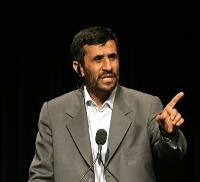At first glance, the power struggle currently taking place among Iran's ruling elites might seem bizarre. After all, it is not often that the chief executive of a 21st-century nation is accused of "witchcraft," "experimenting with exorcism" and "communicating with genies." Mullahs have tarred Iranian President Mahmoud Ahmadinejad's administration as containing "deviants, devils and evil spirits." Ahmadinejad responded that his opponents have launched a "conspiracy" to undo socio-economic changes beneficial to most Iranians.
At the heart of the widening dispute is Ahmadinejad's increasing independence from the system of "velayat-e faqih," or guardianship of the -- religious -- jurist, on which Iran's Shiite theocracy has been grounded since the 1979 revolution. The disputed presidential election in 2009, where protests initially targeted Ahmadinejad but swiftly turned to abolishing the theocratic state, opened this avenue of attack for Ahmadinejad. Now Supreme Leader Ayatollah Ali Khamenei and other mullahs say they fear that Ahmadinejad has turned against guardianship of the jurist. In the process, Ahmadinejad is becoming less of a wildcard, while the Shiite clergy are appearing irrational.
In essence, Iran's political battle is over two possible paths ahead: a continuation of the Islamic Republic with its Islamist system of governance or the emergence of a more secular nation with elected, nonclerical officials.

